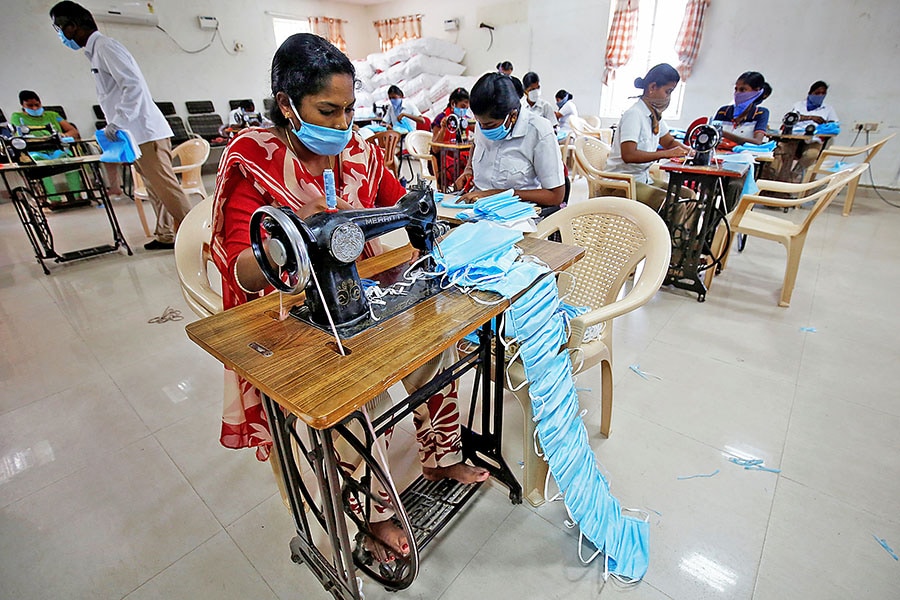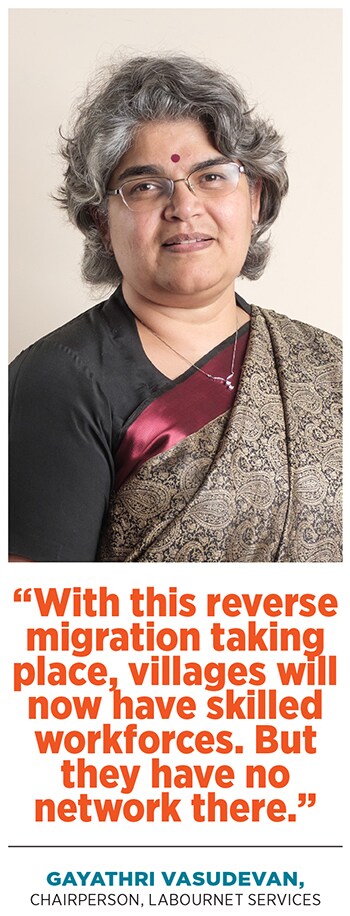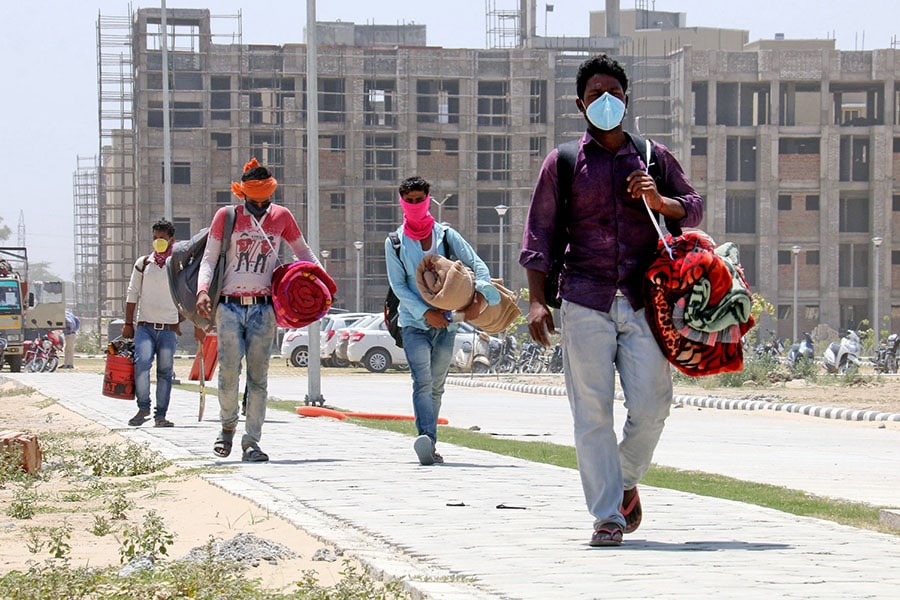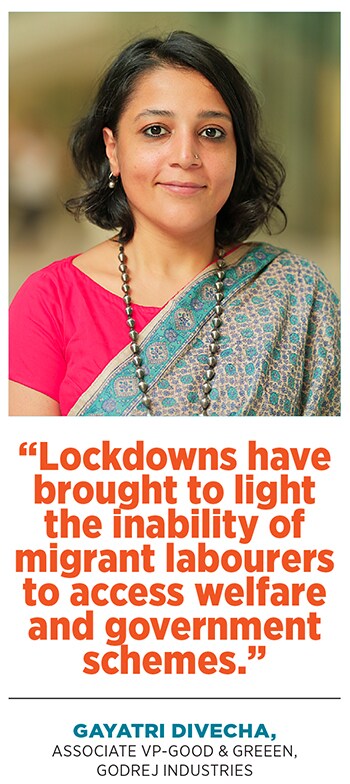How will India's informal sector emerge from the pandemic?
The Covid-19 pandemic and lockdowns have upended India's informal job market. But are there positives from the crisis?


 Women, who form a large chunk of the informal economy, make masks during the lockdown in Chennai
Women, who form a large chunk of the informal economy, make masks during the lockdown in Chennai
Image: P. Ravikumar / Reuters
As the Covid-19 pandemic unfolds in India, and large sections of industries and businesses remain closed, the changing realities for the informal sector workforce are becoming apparent. With uncertainty writ large about what post-Covid-19 workplaces will look like, opportunities for employment appear equally unsure. Adding to this uncertainty is the exodus of lakhs of skilled and unskilled workers from urban centres and manufacturing hubs to their native towns and villages, raising questions about livelihood opportunities for them once they are back home.
“Every sector has been affected,” says Nalini Kaushal, founder of SetuWorks, a Mumbai-based organisation that works towards scalable and sustainable social interventions. “The construction and automobile sectors have been hit hard, as have transport, logistics and hospitality travel and tourism, retail, beauty and wellness... the impact is across the board.”
According to the International Labour Organization (ILO), with limited employment creation in India’s formal economy, the informal economy accounts for more than 80 percent of non-agricultural employment. The United Nations agency adds that the growing level of informal employment within the formal sector is mainly because of the growing use of contract labour and outsourcing of production. The ILO says while women are somewhat more likely to be engaged in the informal economy, they are significantly more likely than men to be informal workers in the formal sector.
A 2019 International Monetary Fund paper titled ‘Measuring Informal Economy in India: Indian Experience’ by SV Ramana Murthy, says an ‘informal worker’ is defined as a worker with no written contract, paid leave, health benefits or social security. “There are 92.4 percent informal workers in the economy. There are also 9.8 percent informal workers in the organised sectors, indicating the level of outsourcing,” the paper says.
“There were signs of the pandemic and subsequent lockdowns affecting labour markets since March,” says, co-founder and executive vice president of TeamLease, a human resource company. “Micro, small and medium enterprises (MSMEs) and startups employ a lot of casual workers. Sectors that depend on discretionary consumption—such as sports, entertainment, aviation and tourism—are badly hit, and they will not make a quick recovery. This is because the emotional contagion around the virus will continue.” The fear of infections, along with shrinking disposable incomes—stemming from insecurities over jobs and wages—will delay the recovery of these sectors, she adds.
.jpg) LabourNet is reskilling workers in roles such as electricians, plumbers and car sanitisers. These jobs will see high demand in a post-Covid world
LabourNet is reskilling workers in roles such as electricians, plumbers and car sanitisers. These jobs will see high demand in a post-Covid world
Elaborating upon MSMEs, Gayathri Vasudevan, chairperson of LabourNet Services, a social enterprise that enables sustainable livelihoods, adds that since the sector has been badly hit, individual enterprises will not need their full manpower when they begin work again and in cases where companies can employ their full workforce, they may not be able to find enough workers, since many of them would have left for their native villages.
“The higher the workers’ skills—such as welders, fitters, fabricators—the higher the chances of them not having any work and the lower their skills, the lower the chances of them staying back at their place of work,” she explains. Similar will be the situation for construction companies, who might want to hold on to their skilled workers, while letting go of the unskilled ones.
Chakraborty says when the economy recovers, a few sectors will have nil or close to nil revenues. For instance, the manufacturing sector will take small steps, and would be unsure if their workers will return.
“So, there will be a temporary wage crisis because of the shortage of workers, perhaps even a wage rationalisation,” she says. “But eventually the workers will come back, because of the way our country’s economy works. A lot of questions, which were not asked before, will also emerge. The companies that are deeply impacted will have to let go of people, but should they? Because rehiring will take time. Every company will do things differently.”
With the government running Shramik Special trains to ferry workers back home—by May 22, Indian Railways had run 2,050 trains, with 30 lakh passengers—media reports estimated that not more than 30 percent of migrant workers have returned from Maharashtra, Delhi, Karnataka, Haryana and Punjab. And as this reverse migration continues from financial and manufacturing hubs, it is near impossible to predict when these workers would want to return to their place of employment. “For a lot of workers, returning home has been a very difficult ordeal, leaving them deeply scarred,” says Kaushal. “And there seems to be a high likelihood that they would want to stay back in their native places if the local economies can support them.”
Opportunity in adversity
Looking at the possibility of creating jobs in entirely new sectors and categories for those who have lost their existing employments are organisations such as LabourNet and SetuWorks. “With this reverse migration taking place, villages will now have skilled workforces,” says Vasudevan. “However, these workers make their professional networks in urban areas, and their place of work. In the villages they have no such network, and will have to build it from scratch.”
There has to be a combination of a “pull and push effect”, adds Kaushal. “For those who are at the bottom of the pyramid, once their food and shelter are secured back home, we will have to convince them to get reskilled. They would want to know what is in it for them so there has to be demand for these new skills as well. We will have to counsel them, and redefine their roles.”

Putting these thoughts into action, Bengaluru-based LabourNet is reskilling and upskilling workers in job roles that did not exist before the pandemic broke out, or in jobs that are now seeing increased demand. The organisation has chalked out skilling pilot projects in 10 different job roles—including tele-callers in the health care sector, vehicle sanitisers, electricians, plumbers, fabricators, etc—and is aiming to train 1 lakh people in each of these. “We are just one organisation aiming to achieve this, and are hoping that others pick up these ideas as well,” she adds.
Direct beneficiaries of these projects are women such as Mamtha Tavarekere of Hosahalli village in Karnataka, and Gayathri Nagappan from Hosur city in Tamil Nadu. Tavarekere, 27, had completed a sewing machine operator’s course conducted by LabourNet in February, with the hope of setting up her own tailoring shop.
“After completing the course I was making items of clothing, such as blouses, for my neighbours and earning about Rs 600 a month. I have also learnt how to stitch men’s shirts, something that most women tailors don’t know how to make,” says the mother of a seven-year-old boy. Although the lockdown has stalled her plans of a tailoring shop, it has opened a different window of opportunity. After receiving additional training, Tavarekere is now stitching masks as part of an order from Swedish automobile makers Volvo Group, and earning Rs 1,500 for seven days of work. “We are expecting another order, so I am expecting to earn Rs 3,000 a month.”
While for Tavarekere this is the first experience of being able to earn a livelihood, for Nagappan, stitching masks has brought interim relief. Having been employed in stitching bags for about a year-and-half under a LabourNet project, she was able to earn Rs 10,000 a month. “But with all shops closed, there is no demand for bags and that project has been temporarily stopped,” says the mother of two. “But after being reskilled by LabourNet, I can make masks and earn between Rs 5,000 and Rs 6,000 a month. It helps fill the income gap to some extent.”
Like the making of masks, another completely new need that has emerged from the pandemic is the sanitisation of vehicles. Grabbing the opportunity, LabourNet is training people in the servicing and sanitisation of vehicles, with youngsters like Satish C, 20, as beneficiaries. While training to be a mechanic for two-wheelers and four-wheelers, Bengaluru-based Satish attended a five-day training programme on sanitising vehicles.
“I wanted to do the course because it is like social work during the pandemic, and it also pays Rs 300 per vehicle,” says the son of a construction worker, who didn’t continue his studies after completing class 12. “We were taught how to spray disinfectants, take precautions like washing ourselves before and after sanitisation work. After we were trained, we went to government offices, hospitals and police stations to sanitise rooms and buildings also, but priority was given to sanitisation of vehicles. I hope to earn about Rs 8,000 from this work.”
Sanitisation of workplaces and vehicles is seeing an uptick even for service providers such as Urban Company (formerly UrbanClap), an online at-home service provider with about 30,000 registered professionals. “Towards the end of the first phase of the national lockdown, we realised that some service categories—such as deep cleaning of homes and furniture, painting of homes, massage and spa services—would take a long time to recover,” says Abhiraj Bhal, co-founder and CEO, Urban Company. “We began to ask ourselves, ‘What can we do to retrain and reskill these professionals in other services?’ The deep-cleaning staff was retrained on disinfection and sanitisation of commercial setups. Massage and spa professionals were retrained in elderly care and support.” Wherever they need new equipment for their new job profiles, Urban Company helps them get access to loans to buy them.
While before the lockdown the training was taking place at Urban Company’s physical centres across the country, after the lockdown it is being conducted online. “We have an in-house team of 200 full-time trainers, and this has significantly helped in these times,” says Bhal.
The reskilling option, which is free of cost, has been well-received by professionals registered with Urban Company, since they had not seen much income in the first month of the lockdown. “We have reskilled more than 1,000 people, and will be reskilling between 2,000 and 2,500 by end of June. We have also onboarded another 1,500 new professionals every month across all categories.”
Bhal feels heartened by the fact that professionals on his platform often refer friends and family members to join. “We receive 7,000 to 8,000 applications a month. You would think that these people would want to earn as much as possible and keep others out instead, in these difficult times, they want others to earn as well, even if their own earnings dip because of a larger pool of professionals.”
Like Vasudevan of LabourNet, Bhal has seen an increase in demand for skilled workers such as air-conditioner mechanics, plumbers and electricians. “These are ‘home essential services’,” he says, predicting a shift among these workers from the unorganised to the organised sector.
Sairee Chahal, founder and CEO of Sheroes, a women-only social network, says the online platforms have seen a wave of interest among users to learn skills like designing on Canva, software programming, digital marketing, data analytics, video making, financial savviness, blogging and content creation. Talking about the roles of women during the pandemic, she adds, “I see a lot of women responding to real-time needs of the crisis—right from making masks to creating access to menstrual health products like sanitary pads… women are everywhere.”
 Construction workers have been badly hit because of the lockdown as projects are stalled
Construction workers have been badly hit because of the lockdown as projects are stalled
Corporates pitch in
Speaking about how different companies have responded to the loss of livelihoods among the vast informal workforces, Priya Naik, founder and CEO of Samhita Social Ventures, a social sector consulting firm, says, “All companies that are grappling with it have been solution-oriented, and we have seen some very creative responses.” She elaborates that while enterprises in the gig economy have taken many proactive steps—raising funds for their employees, providing them with safety gear and health insurance—more established companies are seeing CEOs set aside time and resources for the reskilling of their employees, looking after their supply chain and distribution networks, and unlocking philanthropic and government funds.
Samhita is setting up a fund with three philanthropic foundations as seed funders, two of these are the Michael and Susan Dell Foundation and Omidyar Network India talks are on to onboard Ford Foundation. The money will be disbursed as returnable grants to help people tide over immediate financial requirements: They can use it as working capital to start their own ventures, or use it to get reskilled or trained for new employment. “The thesis behind this approach is that if we can help this person to get a job right now, then their ability to repay the amount is much higher,” explains Naik.

However, there are some sectors, such as construction, which are badly hit and employ large number of informal, migrant workers. “The construction industry itself has been hit for the past few years, and there is no liquid cash,” says Naik. “We are working with a large infrastructure private equity [PE] fund that invests in low-cost housing. A contribution of Rs 250 from the PE fund is matched by developers, and enables a construction worker to get a BOC [Building and Other Construction Worker’s Welfare Board] registration card and get access to government funds.”
Working along these lines is Godrej Industries, which has a real estate vertical. “The current crisis has thrown to light that casual migrant labourers are the foundation of all our homes and offices,” says Gayatri Divecha, associate vice president—Good & Green, Godrej Industries Limited. “The plight of these individuals is not new, but the lockdowns have brought to light the challenges, such as their inability to access welfare and government schemes.”
For instance, to receive government welfare funds, migrant construction workers have to be registered at their place of work—which might change often, as they move from one site or city to another—and procure a certificate from their employer that states they have worked at a specific site for at least three months. This, in itself, is a near impossibility for workers who are barely literate, more so in the language of a different state. The government’s claims of providing digital access to such schemes is equally meaningless for those who barely have functional mobile phones.
“Not-for-profit organisations have lobbied for changes for decades, but the speed and agility with which corporates have now moved is something new,” adds Divecha. Godrej Industries is working with not-for-profit organisations and the Delhi government to ensure that their workers have access to information from contractors, are registered for government schemes, and get access to funds that are allocated for them.
“Workers employed by big builders are probably the least vulnerable. It is the ‘naka worker’—daily wage workers who sit every morning along city roads, waiting to be given work by contractors—who is the most vulnerable,” says Divecha. “The onus to access welfare funds is now on the worker, not the employer. There should be a move to get one-time data from employers about labourers working under them, so that they can be registered with the government.” Taking the same approach to communities located around their manufacturing plants, Godrej Industries is now working to enable local residents gain access to government schemes for which they are eligible.
Long-term reforms
The lack of economic opportunity in vast parts of the country, and individual aspirations and motivations are only some of the reasons behind people migrating for employment and livelihoods. “The urban economy gives them ample opportunities, but economic activities are limited to tier I and II cities,” says Kaushal. “Now it is time to see how we can create pockets of excellence in rural areas, and scale up existing models that have done well.” The focus, she adds, should be on how more people can manage their livelihoods.
Chahal adds that there is a need to reimagine the economy in a way that makes success socially viable for all, and keeps overall sustainability of the planet in mind: “Micro-entrepreneurship, small businesses that serve community needs, skills that can help villages and small towns grow in a sustainable way, leveraging clean and green technology, will be the way forward.”
Chakraborty says India is witnessing the challenge of just a few places being job markets, and the focus now needs to be on creating an ecosystem that encourages job creation. “We need 100 cities to be job markets,” she says.
According to a 2018 report called ‘Employer Led Models of Job Creation’ by the Federation of Indian Chambers of Commerce and Industry, 65 percent of India’s population is in the working age group, and while there are 17 million new entrants into the workforce year-on-year, there are only 5.5 million new jobs that are created every year. This January, the State Bank of India estimated that India will create at least 1.6 million fewer formal jobs across government and low-paying sectors these sectors are the ones that usually absorb a large portion of the millions of youngsters entering the job market every year.
“If the current crisis does not make people change their views about labour reforms, nothing will,” says Chakraborty of TeamLease. “The states from which workers migrate out have to wake up and take care of these lakhs of people. Labour dependency between states will always be there, but taking care of your own people and creating jobs will have to become a clear priority. If we forget about the lessons from Covid-19, nothing in the world will make them do it.”
First Published: Jun 10, 2020, 11:08
Subscribe Now